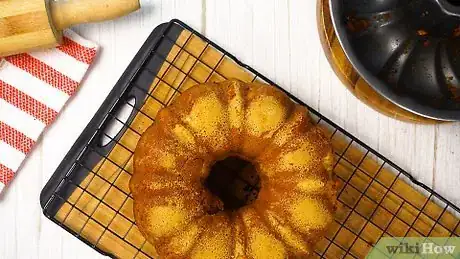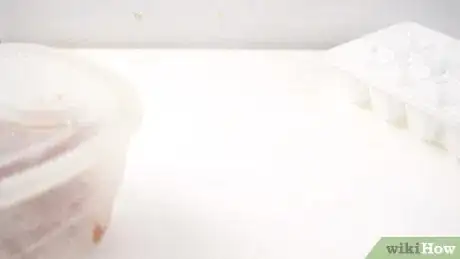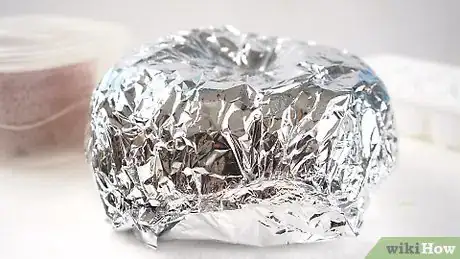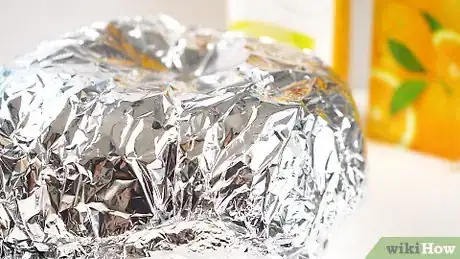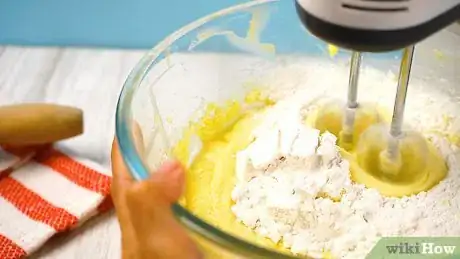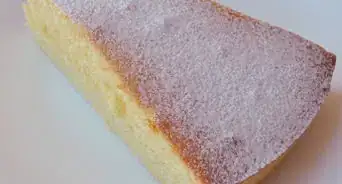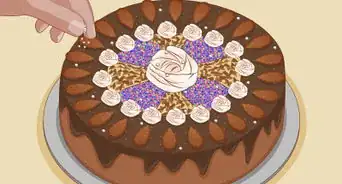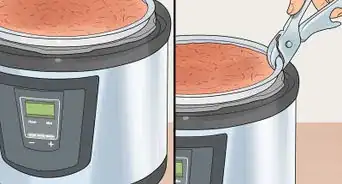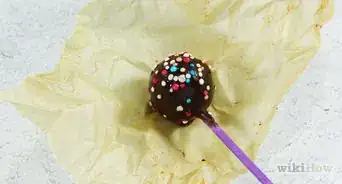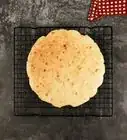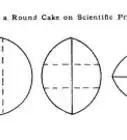This article was co-authored by wikiHow Staff. Our trained team of editors and researchers validate articles for accuracy and comprehensiveness. wikiHow's Content Management Team carefully monitors the work from our editorial staff to ensure that each article is backed by trusted research and meets our high quality standards.
There are 9 references cited in this article, which can be found at the bottom of the page.
The wikiHow Culinary Team also followed the article's instructions and verified that they work.
This article has been viewed 33,321 times.
Learn more...
Bundt cakes are really attractive, delicious cakes that are great for all kinds of celebrations and gatherings. You can easily make one months ahead of time and freeze it until you need it. All you need is some aluminum foil and plastic wrap, and you’ll soon be prepared with a sweet treat you can bring out for friends and family at any time!
Ingredients
- Butter for greasing the pan
- 2 tbsp (30 grams) of coarse sugar for greasing the pan
- 1 3/4 sticks of unsalted butter, at room temperature
- 3 large eggs, at room temperature
- 2 1/2 cups (282 grams) of cake flour
- 1 1/2 tsp (6 grams) of baking powder
- 1/2 tsp (2 grams) of baking soda
- 1/2 tsp (3 grams) of kosher salt
- 1 1/2 cups (300 grams) of granulated sugar
- 5 teaspoons (25 mL) of vanilla extract
- 2⁄3 cup (160 mL) of full-fat sour cream
- 1 tbsp (6 grams) of orange zest
- 1 tablespoon (15 mL) of orange juice
Makes 1 bundt cake; serves 12’'
Glaze Frosting
- 1 tbsp (14 grams) of unsalted butter, at room temperature
- 1 cup (125 grams) of powdered sugar
- 2 tablespoons (30 mL) of boiling water
Steps
Packing and Wrapping the Cake
-
1Let the bundt cake cool completely on a cooling rack. After you’ve baked the bundt cake, leave it in the pan for about 10 minutes. Then, run a knife along the edges to loosen the cake and carefully turn it out onto a cooling rack. Let the cake sit for 1-2 hours, or until it’s completely cool to the touch.[2]
- If you don’t have a cooling rack or wire rack of some kind, place the bundt cake onto a cutting board or some other flat surface.
Tip: It’s easiest to freeze an unfrosted cake, but that’s not always possible. To freeze an already-frosted cake, place it in the freezer, unwrapped, for 4-5 hours. Once it’s completely frozen, remove it and wrap it before putting it back in the freezer. This will prevent the frosting from sticking to the wrap.[3]
-
2Wrap slices of the cake in plastic and aluminum to freeze single portions. If you don’t plan on serving the cake whole, slicing it ahead of time will allow you to freeze individual portions. Wrap each piece of cake in plastic wrap, and then cover that with aluminum foil.[4]
- When you’re ready to enjoy a piece of cake, simply take it out of the freezer and pop it into the fridge for a few hours. It’ll thaw much quicker than an entire cake would.
Advertisement -
3Cover the bundt cake in plastic wrap to prepare it for the freezer. Cut off a large piece of plastic wrap and lay it down on the counter. Set the bundt cake in the middle, then bring the sides up and around the cake. Smooth the plastic wrap against the sides and down into the center of the cake, making it as tight as possible.[5]
- You could also place a second piece of plastic wrap overtop of the cake to ensure it’s completely covered.
- The goal is to cover the cake so that there are no gaps left where air or moisture could get in.
-
4Seal the cake and plastic wrap in aluminum foil to protect it from freezer burn. Take a large piece of aluminum foil and carefully wrap it around the cake. Press it flush against the cake, and push it carefully down into the hole in the center. If needed, use an additional piece of foil to ensure the cake is fully covered.[6]
- Cakes can absorb smells from the freezer, so making sure it’s wrapped properly is really important.
Tip: You could also place your wrapped cake inside an airtight container. This will give it added protection from freezer burn, and it’ll make sure nothing bumps into it and disfigures it.[7]
Storing and Thawing
-
1Clear out space in your freezer so the cake can rest on a flat surface. Ideally, position the cake so that it’s not being touched on either side. Don’t place anything on top of it so it doesn’t get squished.
-
2Store your cake in the freezer and use it within 2-4 months. While the cake will technically be safe for longer if it’s kept at 0 °F (−18 °C), it’ll have the best, freshest taste if you can eat it within a few months. This is a great method to use if you want to make a cake ahead of time for a special occasion.[8]
- Make sure to write the date on the aluminum foil in marker.
-
3Thaw the still-wrapped cake in the fridge overnight. The day before you want to have the cake, take it out of the freezer and place it into the fridge so it can thaw overnight. Doing this will keep it from getting too warm too quickly and potentially changing the consistency of the cake.[9]
- Avoid the temptation to unwrap the cake and put it in the microwave or oven! Trying to defrost and warm up the cake too quickly will cause extra condensation, which will turn your cake into mush.
-
4Frost your cake if it wasn’t already frosted. Measure 1 cup (125 grams) of powdered sugar into a bowl. Create a small well in the middle and add 1 tbsp (14 grams) of softened butter and 2 tablespoons (30 mL) of boiling water. Stir the ingredients together until it has formed a glaze. Slowly pour it overtop of the bundt cake.[10]
- Depending on the recipe you followed, you may just want to dust the cake with powdered sugar or serve it with fresh whipped cream.
Making a Simple Bundt Cake
-
1Preheat the oven to 350 °F (177 °C) and grease and sugar the bundt pan. Greasing the pan is super important when you make a bundt cake, otherwise, it may not come out of the mold very easily and could even break apart. Rub butter over the entire interior of the mold so it’s coated in a thin layer. Take 2 tbsp (30 grams) of coarse sugar and sprinkle it over the mold; do your best to sprinkle it in an even layer over the entire thing.[11]
- For the coarse sugar, look for turbinado, demerara, or raw sugar in the baking aisle.
- Not only does this method create a crust, but it also adds a really sweet crunch to the outside of the cake.
- With the sugary coat on top, you can skip the frosting or glaze if you want to.
Tip: Remember that the butter and eggs for your recipe need to be at room temperature. If you haven’t taken them out yet, do it now!
-
2Sift the cake flour, baking powder, baking soda, and salt into a large bowl. Measure out 2 1/2 cups (282 grams) of cake flour, 1 1/2 tsp (6 grams) of baking powder, 1/2 tsp (2 grams) of baking soda, and 1/2 tsp (3 grams) of kosher salt. Pour the ingredients through a strainer or sifter placed over a large mixing bowl. Shake the sifter back and forth to disperse the ingredients.[12]
- If you don’t have cake flour, take 1 cup (120 grams) of all-purpose flour, remove 2 tbsp (16 grams), and add in 2 tbsp (15 grams) of cornstarch or arrowroot powder. Do this for each cup of cake flour your recipe calls for.
- Sifting ingredients helps create a fluffier, lighter cake.
-
3Cream the butter in an electric or stand mixer and then add the sugar. In a large mixing bowl, beat 1 3/4 sticks of unsalted butter on medium speed for about 30 seconds. Add the sugar to the bowl 1/2 cup (100 grams) at a time, until you’ve added 1 1/2 cups (300 grams) total. Stop every once in a while and use a spatula to scrape down the sides of the bowl.[13]
- If you don’t have a stand mixer or electric mixer, you can try making this recipe by hand. It’ll take a lot of arm work and the texture of the cake might turn out a little denser, but it should still taste good!
-
4Add the vanilla to the bowl and beat the mixture on high for 5-6 minutes. Measure 5 teaspoons (25 mL) of vanilla extract and add it to the bowl of butter and sugar. Increase the speed on the mixer and set a timer for 5-6 minutes—the batter should be fluffy and light after the time has passed.[14]
- Try substituting the vanilla extract for almond extract for a slightly different flavor.
-
5Beat the eggs into the butter mixture 1 at a time. Keep the mixer running continuously as you crack each egg into the bowl. Use 3 eggs, making sure to incorporate each one fully into the batter before adding the next one.[15]
- If you notice that the batter is starting to look curdled or separated, add 1-2 tbsp (8-16 grams) of the flour mixture to the bowl.
-
6Turn the mixer to low and carefully add the flour mixture to the bowl. Avoid dumping all of the flour into the butter mixture at once, otherwise, you’ll end up with flour flying everywhere. Stop mixing and scrape down the sides of the bowl a few times throughout to make sure everything is getting mixed together.[16]
- Using a low speed should help prevent the flour from flying out of the bowl.
- You could also try draping a clean dishtowel over the bowl as you mix to catch anything that is coming out.
-
7Mix the sour cream, orange zest, and orange juice into the bowl. Once all the other ingredients have been incorporated, add 2⁄3 cup (160 mL) of full-fat sour cream, 1 tbsp (6 grams) of orange zest, and 1 tablespoon (15 mL) of orange juice. Mix on low for 1-2 minutes until the sour cream has completely blended in with the rest of the ingredients.[17]
- Gently rub a microplane back and forth over the skin of an orange to get the zest.
- Cut the orange in half and squeeze the liquid into a small bowl to get the juice for the batter.
-
8Pour the batter into the prepared bundt pan and bake it for 45 minutes. Pour the batter slowly and turn the mold occasionally so that the batter goes evenly into the pan. Use a spatula to scrape down the sides and get all the batter out of the bowl. Place the pan in the oven and set a timer for 45 minutes.[18]
- Test if the cake is done by sticking a toothpick or skewer in. If it comes out clean, the cake is done! If it looks gooey, it needs a few more minutes.
-
9Cool the cake for 10 minutes, then flip it out of the pan onto a cooling rack. Carefully remove the cake from the oven. Leave it alone for 10 minutes, then run a butter knife along the edges to help separate it from the mold. Place a cooling rack on top of the pan, then flip everything over so the rack is on the bottom. Gently lift the mold and remove it from the cake.[19]
- Hopefully, the cake should come free of the mold easily. If it sticks, try using the butter knife to loosen it as much as possible.
- Once the cake is done, you can eat it as-is, frost it, or save it for later in the day.
Warnings
- Always wear oven mitts when taking hot things out of the oven.⧼thumbs_response⧽
Things You’ll Need
Packing and Wrapping the Cake
- Cooling rack
- Knife (optional)
- Plastic wrap
- Aluminum foil
Storing and Thawing
- Marker
- Small bowl
- Spoon
- Measuring cups and spoons
Making a Simple Bundt Cake
- Bundt pan
- Electric or stand mixer
- Strainer or sifter
- Measuring cups and spoons
- Mixing bowls
- Spatula
- Microplane
- Knife
- Toothpick
- Cooling rack
References
- ↑ https://www.thekitchn.com/how-to-bundt-cake-recipe-23005020
- ↑ https://www.thekitchn.com/how-to-bundt-cake-recipe-23005020
- ↑ https://www.thekitchn.com/can-i-freeze-a-fullydecorated-138328
- ↑ https://www.thekitchn.com/just-a-slice-freezing-cake-for-one-or-two-168316
- ↑ https://www.foodnetwork.com/recipes/articles/cakes-tips-and-techniques
- ↑ https://www.foodnetwork.com/recipes/articles/cakes-tips-and-techniques
- ↑ http://www.storingandfreezing.co.uk/how-freeze-cakes-baked-goods.html
- ↑ https://nchfp.uga.edu/publications/uga/FreezingPreparedFoods.pdf
- ↑ https://sallysbakingaddiction.com/how-to-freeze-cakes/
- ↑ https://www.thekitchn.com/how-to-bundt-cake-recipe-23005020
- ↑ https://www.thekitchn.com/how-to-bundt-cake-recipe-23005020
- ↑ https://www.thekitchn.com/how-to-bundt-cake-recipe-23005020
- ↑ https://www.thekitchn.com/how-to-bundt-cake-recipe-23005020
- ↑ https://www.thekitchn.com/how-to-bundt-cake-recipe-23005020
- ↑ https://www.thekitchn.com/how-to-bundt-cake-recipe-23005020
- ↑ https://www.thekitchn.com/how-to-bundt-cake-recipe-23005020
- ↑ https://www.thekitchn.com/how-to-bundt-cake-recipe-23005020
- ↑ https://www.thekitchn.com/how-to-bundt-cake-recipe-23005020
- ↑ https://www.thekitchn.com/how-to-bundt-cake-recipe-23005020
- ↑ https://www.thekitchn.com/expert-advice-how-to-wrap-stor-151924
- ↑ https://www.completelydelicious.com/store-freeze-cake-layers/
About This Article
Freezing is a great way to keep a Bundt cake fresh until you’re ready to eat it. If you just baked the cake, let it cool completely on a wire rack before you freeze it. This usually takes about 1 to 2 hours. If you like, slice the cake into individual portions and wrap each piece in plastic wrap. Then, wrap each piece again in aluminum foil. The smaller pieces will thaw much faster than a whole cake once you’re ready to serve them. Alternatively, wrap the entire cake in plastic wrap as tightly as you can without damaging the cake. Check carefully to make sure there are no gaps in the wrapping where moisture can get in. Next, wrap the cake in a layer of aluminum foil, which will help protect it from freezer burn. Smooth the foil down and make it as flush with the cake as possible. Store your cake in the freezer on a flat surface. Your cake will be at its freshest if you eat or serve it within 2 to 4 months. Be sure to label it with the date when you froze it so you can keep track. For tips on how to thaw your cake, read on!
